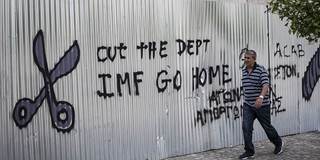Since the start of the Great Recession in mid-2007, the IMF’s actions have mostly served the interests of its major shareholders. When finance ministers and central bank governors meet in Washington, DC, next week for the Fund’s annual meeting, will they have the energy to push for greater independence and credibility?
PRINCETON – Critics have long contended that the International Monetary Fund mainly serves the interests of its major shareholders. In fact, at its best, the Fund has helped crystalize global consensus on macroeconomic policy and coordination. But, since the start of the Great Recession in mid-2007, its actions have mostly confirmed the detractors’ critique.

PRINCETON – Critics have long contended that the International Monetary Fund mainly serves the interests of its major shareholders. In fact, at its best, the Fund has helped crystalize global consensus on macroeconomic policy and coordination. But, since the start of the Great Recession in mid-2007, its actions have mostly confirmed the detractors’ critique.